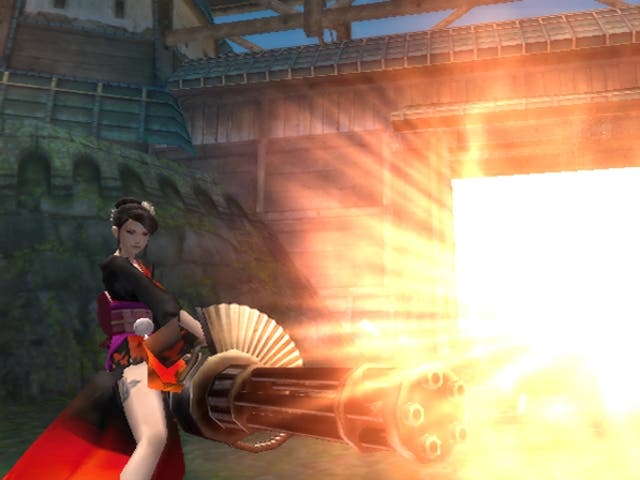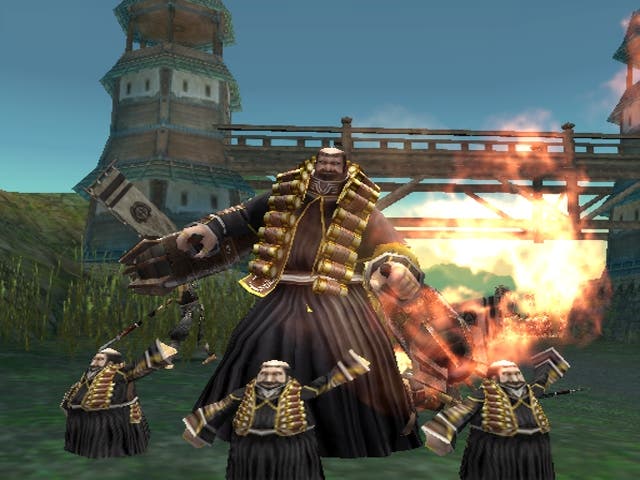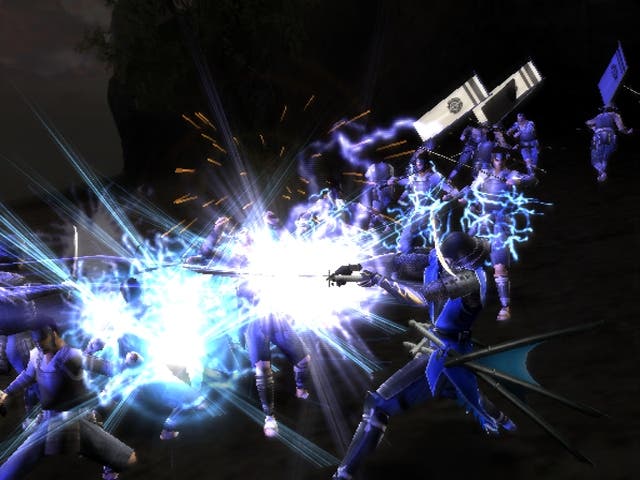Devil Kings
Smash and grab.
With Devil Kings Capcom has committed daylight robbery. Having happily plagiarised its own back catalogue over the years, releasing tweaks pretending to be updates masquerading as sequels, the Japanese giant has stomped shamelessly into the Koei camp and plundered its popular Dynasty Warriors series. This is much more than Resident Evil ripping off Alone in the Dark. If a jury was shown both Devil Kings and one of the Dynasty Warriors games running side by side it would be very difficult to tell the two apart. Both cast you as a warrior general, dropped onto an ancient battlefield awash with hundreds of enemy soldiers. Both require you to lay said soldiers low with a big stick or similar pointy implement. You even get to ride around on a horse, as warrior generals like to do. Beyond brawling, the games feature a selection of customisable characters, all with their own back-stories, and there are some basic battle options to tinker with. In short, they look the same and pretty much play the same. It’s an open and shut case.
Devil Kings may well be a forgery but it’s certainly not faking it. To rub salt into angry-looking wounds, Capcom has taken the Koei’s long-running series and audaciously improved upon it at the first attempt. Now don’t get me wrong - if you’ve not shown the Dynasty Warriors games any love before then Devil Kings won’t fan the flames of your heart. Instead, it takes the source material and walks it down the bigger-better-more path that Capcom likes to call its own. The action is faster, the special moves are wilder, and the onscreen carnage is off the scale. Tapping the standard attack button is surprisingly effective - anyone within spitting distance will fall beneath your blade - but by combining this with your secondary attack (which ‘primes’ your enemies ready for the kill) you can supercharge your Fury Gauge and unleash a Fury Drive! This special move, aptly described in the game’s rolling demo as “ultra radical”, sees your character swirl around the screen, sucking up enemy soldiers and spitting out their lifeless bodies. It’s classic Capcom.

While many of the special moves and attack combos are completely over the top, the gameplay is actually more measured than in Dynasty Warriors. This is mainly thanks to the introduction of a guard move which you must use to block enemy attacks (and as an added bonus, if you block at exactly the right time, the attack will be returned to sender). In easy mode you can slaughter entire armies by bashing the attack buttons, but in normal and hard mode several direct hits will result in death, so you must play with far more caution. In fact, the difference between the easy and normal difficult levels is alarming at first, being more of a leap into the unknown than a step up. This will certainly test your revolve; possibly your patience too.
The game’s 18 stages are nicely structured, with new areas opening up as you fight your way through the enemy ranks, leading to a confrontation with a rival general. Sometimes you’ll be required to complete certain secondary objectives along the way, ensuring that the game never quite becomes just a mindless melee. That said, the more enemies you slay the more experience points you earn, which in turn can be used to level-up your character’s stats, so the emphasis is firmly on hack ’n’ slash.

To stave off monotony, Capcom has introduced a combo system where attacks can be linked together for massive bonuses. Keeping an attack flowing for any length of time requires a surprising amount of skill and proves to be a fun mini-game in itself. After prolonged play I finally managed to reach the magic 1,000 hit marker, only to later discover on the web that some kid from Kyoto has already topped 11,000. Doesn’t he know that you’re supposed to take a 10-minute screen break every hour?
The only thing Dynasty Warriors has in its favour over Devil Kings is co-op gameplay. Quite why Capcom chose to forgo a multiplayer mode is baffling as it would have prolonged the game’s somewhat limited lifespan. Still, between the two competing titles Devil Kings comes out on top, bloodied and battered but victorious nonetheless.
I make no apologies for writing a comparison review rather than considering Devil Kings on its own merits, because let’s face it, if you’re still with me then you’re obviously a rabid fan of Dynasty Warriors and other games of this type. You’ve possibly even played Sengoku Basara, the original Japanese version of Devil Kings. If you have then you’ll be disappointed to learn that Capcom has made a real mess of the localisation.

Capcom is well known for its lazy PAL releases, going right back to the awful Street Fighter II on the SNES, but here it has gone to the other extreme in foolishly trying to westernise the game. Sengoku Basara is based in feudal Japan, like Koei's Samurai Warriors, while Devil Kings takes place in a purely fantasy universe. The names of the historical characters have been changed, lots of modern weapons have been added and several of the stages have even been altered to reflect the new made-up scenario. There are six less playable characters too (12 instead of the original 18), making this inferior to the Japanese original in almost every way.
Despite dodgy localisation issues - which actually serve to limit the game’s appeal - Devil Kings remains an entertaining battlefield game that marries its wild, over the top style with enough substance to keep you plugging away. As this type of game goes, it's easily the best of breed. Sorry Koei, but you’ve been robbed.

